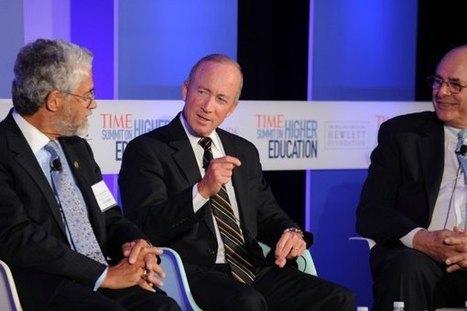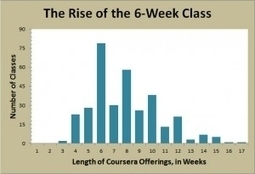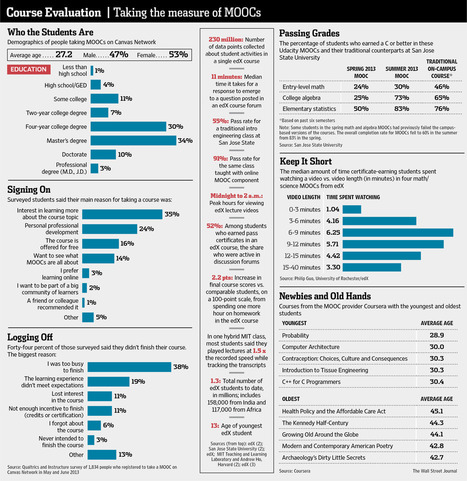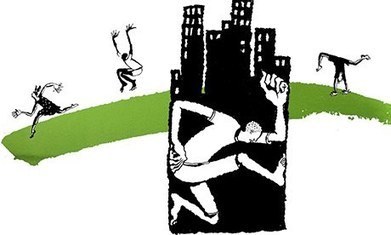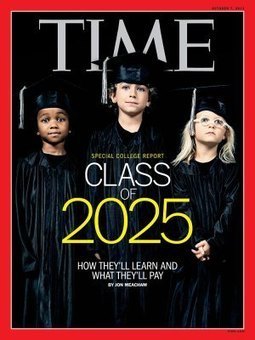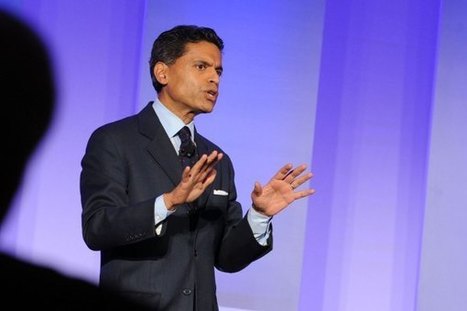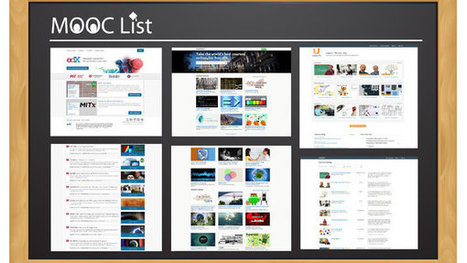 Your new post is loading...
 Your new post is loading...
Harvard's courses, in a program known as HBX, are expected to be available on MOOC platform edX by spring or summer 2014 Harvard Business School is quietly developing its first online learning initiative, which it hopes will make HBS the world’s top provider of high quality online business education. The move has the potential to shake up the nascent online education market and give the elite business school a toehold in the world of MOOCs, or massive open online courses. It’s a high-stakes gamble for HBS, which has one of the world’s best-known—and carefully burnished—educational brands. John Fernandes, the chief executive of the business school accreditation group Association to Advance Collegiate Schools of Business, called Harvard’s move a “watershed” moment for the century-old business school, which will be adding a third delivery model to the MBA and executive education programs it now offers.
Earlier this month, Google and EdX announced a partnership to co-develop MOOC.org, to broaden access to EdX’s open source online education platform. The combination of EdX – a random band of elite universities experimenting in multiple ways on a new platform – and Google – the world’s dominant online search firm with few genuine rivals – speaks to the ambiguity around MOOC.org. Is the ultimate goal enabling yet more local experimentation (from which higher education clearly does not suffer a shortage), or to really try to advance the consolidation necessary to impact learning quality at scale? To date, online higher education has generally advanced by disavowing any allegations of standardization, cost reduction or threat to faculty-as-artisan. The result has been lots of local trial-and-error, weak differentiation between schools, and a “product” that does little to tackle the cost, quality and completion challenges that weigh down higher education at large. For-profit universities have shown that rapid growth and scale is possible, but have failed to make the pedagogic case.
Skilled for Life - Key findings from the survey of adult skills (Andreas Schleicher - Special advisor to the Secretary-General on Education Policy
Massive open online courses promise to change the face of higher education, one giant classroom at a time. Here's what they're doing well—and how they can do better. Big-name schools have also signed on to the idea. Top institutions—from Harvard University to the Massachusetts Institute of Technology to Stanford University—and some companies have joined with MOOC providers to put courses online, free to anyone who wants to access them. Now more schools, to expand their student base and potentially reduce the cost of an education, are building online courses that cost money but offer actual college credit.
Over the past 3 years, a new wave of online education start-ups and MOOCs has grown in large part due to a specific focus on integrated, deliberate practice as a core part of the curriculum. Over the past 3 years, a new wave of online education start-ups and MOOCs has grown in large part due to a specific focus on integrated, deliberate practice as a core part of the curriculum. Rather than merely rehashing recorded lectures, these new online platforms typically include: Classes taught by highly knowledgeable instructors -- and access to the instructors outside of classExample files so students can see the theories in action rather than just memorize dataInteractive challenges students must complete that help them retain and apply concepts More impressive than the revolutionary access to this information is what students are doing with it -- in some cases, learning skills so well that they go on to build businesses or get jobs in their respective fields.
New niche certifications being offered by providers of massive open online courses, or MOOCs, are aimed at satisfying employers' specific needs. Available at a fraction of the cost of a four-year degree, they represent the latest crack in the monopoly traditional universities have in credentialing higher education. "The common denominator [among the new MOOC certification programs] is that there really is an interest in finding credentials that don't require a student to buy the entire degree," said Sebastian Thrun, the Stanford University computer-science professor who co-founded Udacity, a MOOC with 1.6 million enrolled students in 200 countries. "This is really democratizing education at its best."
How digital learning can become a part of every campus Some wonder whether today’s online technologies—specifically, massive open online courses, or MOOCs, which can reach many thousands of students at a comparatively low cost—could be an answer. I am convinced that digital learning is the most important innovation in education since the printing press. Yet if we want to know whether these technologies will make a college degree less expensive, we may be asking the wrong question. I believe they will; we are assessing this possibility at MIT even now. But first we should use these tools to make higher education better—in fact, to reinvent it. When the class of 2025 arrives on campuses, these technologies will have reshaped the entire concept of college in ways we cannot yet predict. Those transformations may change the whole equation, from access to effectiveness to cost. To understand the potential, it’s important to focus on what digital learning is good for. At least at the moment, it is surely not very good at replacing a close personal connection with an inspiring teacher and mentor. However, it is incomparably good at opening possibilities for billions of human beings who have little or no other access to higher learning. The global appetite for advanced learning is enormous: MIT OpenCourseWare—the initiative we started in 2002 to post virtually all our course materials for free online—has attracted 150 million learners worldwide. Today learners from every state in America and every nation on earth are actually taking MIT online classes; the edX platform we launched with Harvard 17 months ago has enrolled 1.25 million unique learners—10 times the number of living MIT graduates. With our edX partner institutions, we see an immense opportunity to help people transform their lives. Yet digital learning also offers surprising advantages even for students with access to the best educational resources. First, digital technologies are remarkably good at teaching content: the basic concepts of circuits and electronics, the principles of chemistry, the evolution of architectural styles. At an online-learning summit at MIT, one eminent professor of physics from a peer university explained that although he loves lecturing and receives top ratings in student reviews, he recently came to rethink his entire approach. Why? Because testing indicated that many students did not come away from his lectures ready to apply the concepts he aimed to teach. By contrast, comparable students taught through online exercises—including immediate practice, feedback and reinforcement—retained the concepts better and were better prepared to put them into practice. With so much introductory material moving online, instructors can take time that was previously reserved for lectures and use it to exploit the power of innovative teaching techniques. A 2011 study co-authored by physics Nobel laureate Carl Wieman at the University of British Columbia showed the benefits: when tested on identical material, students taught through a highly interactive “flipped classroom” approach did nearly twice as well as peers taught via traditional lectures. Digital learning technologies offer a second advantage, which is harder to quantify but is deeply appealing to both students and faculty: flexibility. Just as college traditionally requires four years at the same academic address, traditional courses require large groups of students to regularly gather at the same time and place. By making it possible to break the course content into dozens of small conceptual modules of instruction and testing, digital learning allows students to engage the material anytime, any day, as often as they need to, anywhere in the world. A student can now spend a year immersed in remote field research on an important problem while staying in sync with the courses in her major. A team of students working on a project can now reach for a new concept just at the moment they need it to solve a problem—the most powerful learning incentive of all. And we are only beginning to benefit from a third advantage of digital learning: the ability to analyze and gain information from the vast data we are generating about how people actually learn best. By providing, on a huge scale, a systematic, data-driven way to learn about learning, online technologies will provide testable conclusions that could improve teaching methods and strategies for both online and in-person instruction.
There’s nothing like being successful in the past to make you feel like a loser today. Take America—particularly America’s science, technology, engineering and math (STEM) sector. The big wins of the 20th century were pretty much all ours: First man on the moon? Check. Polio vaccine? Check. HubbleSpace Telescope? Check. Creation of the Internet? Check. Towering research institutions like MIT, Caltech and Berkeley? Check, check and check. But the U.S. is in no position to boast these days. Consider these numbers from this morning’s TIME Education Summit panel on Basic and Applied Research. Last year’s entire operating budget for the National Science Foundation was $7.4 billion—or only $400 million more than Americans spent on potato chips in the same period. Last year too, 20% of undergrads in China were studying in the STEM fields. In Europe it was 11%. In the U.S. it was 4.4%.
Is the modern university able to change? A panel, moderated by Nick Lemann, discusses the transformation of higher education in the 21st century at the 2013 TIME Summit on Higher Education.
Fareed Zakaria, TIME's editor at large, opened the TIME Summit on Higher Education on Thursday evening in New York City by reminding his audience that "eight of our top 10 universities in the world are American. Zakaria launched the discussion by noting that up till now, the method of university instruction hadn’t changed much since Aristotle. But with the advent of low-cost or free MOOCs, we are ”achieving scale on an unimaginable level. Hundreds of thousands of people able to take a single course but also customization on a scale that’s unimaginable.” And, businesses will adapt to the new technology and accept online classes as qualifications for employees, said Norman Augustine. The name of the school doesn’t matters as much as results. ”If you ask me what school most of my colleagues went to, I don’t have the faintest idea. That question is what do they contribute?” He joked that though his answer might not be very popular among academics, MOOCs could easily be the future. “The test will be, what do people learn and what do they know,” he said.
A new report called the Global Teacher Status Index aims to show where teachers are, what they're doing, and where they're going. Sorted by country! There is a new study out this morning that ranks the status of teachers in various countries. It’s called the “Global Teacher Status Index” and is published by the Varkey GEMS Foundation. The 2013 study aims to showcase where teachers are, what they’re doing, and where they’re going. I’ve been reading through the report (download it here) over the past few days and it’s quite interesting. For starters, check out the chart below (available in the report linked above) that shows which country respects the profession of teaching the most. As you can see, China, Greece, and Turkey lead the pack. The US and UK are in the middle of the pack. Israel and Brazil are at the tail end. Was that what you expected?
Findings show that people (not technology) will drive change, revenue is the ultimate goal, and HE is globalising, but gradually "What will higher education look like in 2020?" Tackling this broad question was a departure from the usual data-led work of the Observatory on Borderless Higher Education where I am director. The short answer is that 2020 is only seven years away and, with a bit of luck, things should not get much worse. The approach of our recent Horizon Scanning report for the International Unit and Leadership Foundation for Higher Education was dictated partly by the current landscape of higher education and further shaped by judgement. Its frame of reference included transnational education (TNE), Moocs, and ongoing debates around the sustainability of recruitment and international mobility. Other contributing factors were funding, student trends, trade liberalisation and the role of international rankings. The paper concludes with a note on disruptive political change – while intended to be relevant to planning and policy decisions, it is descriptive and analytical rather than prescriptive. Here are three key digests from its findings:
|
Um herói que, em nome da justiça social, revelou como os bancos enriquecem graças ao dinheiro sujo ou só um ladrão, ainda que sofisticado?
Coursera's co-founder, Andrew Ng, argues that most college-level classes don't need to run 12 weeks. In many cases, shorter is better. What’s making conciseness so appealing? In a new LinkedIn Influencers post, I share some of Ng’s perspectives. Coursera’s classes typically experience two waves of attrition. The first involves people who sign up for classes and then never attend a lecture — or give up after a few minutes. That sort of casual browsing doesn’t bother Coursera insiders. The site is designed to make such window-shopping easy.
The world of massive open online courses, or MOOCs, is shaking up academia in the US. But many are actively embracing it in regions like Latin America. A few superstar professors pull in upward of 10,000 students around the globe into free, or nearly free, courses. But others perceive the courses as a dangerous fad that will shrink faculties, turn existing professors into glorified teaching assistants and replace meaningful classroom discussion with message boards and student-led forums. Lost in the debate about online learning, however, is its impact in far-flung regions of the globe, places like the electrical engineering department at the University of El Salvador and the modest walk-up apartment of the Palacios family, above the medical clinic of Dr. Roberto Palacios Navarro, Roosemberth’s father. “At school, he hardly studies. He just shows up and takes the exams,” Dr. Palacios said of his son. But it isn’t for lack of ambition. “He wants to learn,” he said. Added the son: “I don’t like simple things.” That is evident within minutes of arriving at the open-air, tile-floor home, where the teenager shows off a workbench where he solders circuit boards and flips through the pages of his own proposal to build an unmanned helicopter.
Massive open online courses promise to change the face of higher education, one giant classroom at a time. Here's what they're doing well—and how they can do better.
Online learning -- done right -- is the most effective way to reach a majority of those students for whom higher education would otherwise be out of reach. This path to accessible education through online and open courses originated in the open source movement, which began well over 30 years ago among scholars and engineers who wanted to create software that could be endlessly modified and redistributed as users found new and different uses for it. Anyone with some programming knowledge could jump into the game, and this accessibility promoted a level of collaboration that ultimately resulted in a better quality product. The movement, at its best, does not allow discrimination of any sort and requires that the work remains open and available to all. These tenets speak to the best of online learning. At their most aspirational, online degree programs have built upon the open source premise, arguing that offering courses available to everyone is the best way to create a level playing field in the post-secondary market. At their worst, they become a bait and switch, in which students take on enormous debt and receive virtually no support to enable them to transcend the roadblocks to completion that many students face. The most at-risk students are first generation college students, employed full-time, frequently in need of writing or math remediation, and often caring for young children. They are studying late at night and early in the morning. They write papers with children pulling at their shirts and they submit responses to other students' discussions while making dinner or riding the train to a second job or waiting to pick up a kid from practice. Accessibility takes all of these barriers into account.
George Monbiot: The 10-year-old Londoners I took to Wales were proof that a week in the countryside is worth three months in a classroom When children are demonised by the newspapers, they are often described as feral. But feral is what children should be: it means released from captivity or domestication. Those who live in crowded flats, surrounded by concrete, mown grass and other people's property, cannot escape their captivity without breaking the law. Games and explorations that are seen as healthy in the countryside are criminalised in the cities. Children who have never visited the countryside – 50% in the UK, according to WideHorizons – live under constant restraint. Why shouldn't every child spend a week in the countryside every term? Why shouldn't everyone be allowed to develop the kind of skills the children I met were learning: rock climbing, gorge scrambling, caving, night walking, ropework and natural history? Getting wet and tired and filthy and cold, immersing yourself, metaphorically and literally, in the natural world: surely by these means you discover more about yourself and the world around you than you do during three months in a classroom. What kind of government would deprive children of this experience?
America must resolve the conflict between knowledge and know-how Reports on what supposedly educated Americans know—and more sensationally, don’t know—come along fairly regularly, each more depressing than the last. A survey of recent college graduates commissioned by the American Council of Trustees and Alumni and conducted by GfK Roper last year found that barely half knew that the U.S. Constitution establishes the separation of powers. Forty-three percent failed to identify John Roberts as Chief Justice; 62% didn’t know the correct length of congressional terms of office. Higher education has never been more expensive—or seemingly less demanding. According to the 2011 book Academically Adrift, by Richard Arum and Josipa Roksa, full-time students in 1961 devoted 40 hours per week to schoolwork and studying; by 2003 that had declined to 27 hours. And even those hours may not be all that effective: the book also notes that 36% of college graduates had not shown any significant cognitive gains over four years. According to data gathered by the Chronicle of Higher Education and American Public Media’s Marketplace, half of employers say they have trouble finding qualified recent college graduates to hire. Everybody has an opinion about what matters most. While Bill Gates worries about the dearth of engineering and science graduates, the American Academy of Arts and Sciences frets about the fate of the humanities.
Arne Duncan previews Obama's plan for grading universities at TIME's Education Summit In August, the Obama administration announced plans for a new college rating system to be implemented by the 2015 school year that would eventually determine federal funding for various institutions. “Colleges that keep their tuition down and are providing high quality education are the ones that are going to see their tax payer funding go up,” President Obama said in a speech outlining the plan at the University of New York at Buffalo. “It is time to stop subsidizing schools that are not producing good results.” The rating system, the Administration hopes, will help students and parents figure out which colleges offer the best chance of graduating and the best value.
TIME's editor at large, Fareed Zakaria, addresses the TIME Summit on Higher Education in New York City on September 19th, 2013. You can find more from the summit here.
Academic and corporate leaders map path for schools struggling in current financial climate What is unique about American higher education is a partnership between the university, government, states and business world. But what’s happening right now is that partnership is beginning to fray,” said James Dunderstadt, former president of the University of Michigan. One path forward for universities is for them to assist each other, they said. Dunderstadt pointed to the University of Pittsburgh and Carnegie Mellon—two schools that have little in common besides proximity—sharing resources and working together to achieve goals. “We’re talking about cooperation and commitment across the state,” Dunderstadt said.
The U.S. still leads the world in scientific innovation. But years of declining investment and fresh competition from abroad threaten to end our supremacy
Three major sites have emerged in the last couple of years to offer massive open online courses, greatly expanding the opportunity to take college classes. While there are some significant differences among the major MOOC Web sites, they share several main elements. Courses are available to anyone with access to the Internet. They are free, and students receive a certificate of completion at the end. With rare exceptions, you cannot earn college credit for taking one of these courses, at least for now.
|

 Your new post is loading...
Your new post is loading...
 Your new post is loading...
Your new post is loading...












